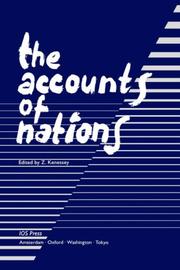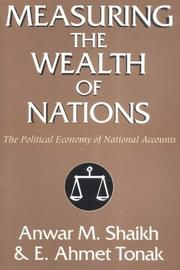| Listing 1 - 8 of 8 |
Sort by
|
Book
ISBN: 9264242295 Year: 1994
Abstract | Keywords | Export | Availability | Bookmark
 Loading...
Loading...Choose an application
- Reference Manager
- EndNote
- RefWorks (Direct export to RefWorks)
comptes nationaux --- hongrie --- HU / Hungary - Hongarije - Hongrie --- 339.0 --- nationale rekeningen --- hongarije --- Algemeenheden. Nationale rekeningen
Book
ISBN: 9212611419 Year: 1994 Publisher: New York Nations Unies
Abstract | Keywords | Export | Availability | Bookmark
 Loading...
Loading...Choose an application
- Reference Manager
- EndNote
- RefWorks (Direct export to RefWorks)
Book
ISBN: 9211613736 Year: 1994 Publisher: New York United Nations
Abstract | Keywords | Export | Availability | Bookmark
 Loading...
Loading...Choose an application
- Reference Manager
- EndNote
- RefWorks (Direct export to RefWorks)
AA / International- internationaal --- 050 --- 339.0 --- 307.362 --- Officiële publicaties (per land). --- Algemeenheden. Nationale rekeningen. --- Statistieken van het nationaal inkomen. --- Officiële publicaties (per land) --- Algemeenheden. Nationale rekeningen --- Statistieken van het nationaal inkomen
Book
ISBN: 3486221272 Year: 1994 Publisher: München Oldenbourg
Abstract | Keywords | Export | Availability | Bookmark
 Loading...
Loading...Choose an application
- Reference Manager
- EndNote
- RefWorks (Direct export to RefWorks)
AA / International- internationaal --- 339.0 --- 305.4 --- Algemeenheden. Nationale rekeningen. --- Econometrie van de inkomensvorming, de spaarvorming, de kapitaalvorming. Input-output tabellen. --- National accounts --- Algemeenheden. Nationale rekeningen --- Econometrie van de inkomensvorming, de spaarvorming, de kapitaalvorming. Input-output tabellen
Book
ISBN: 3486265814 Year: 1994 Publisher: München Oldenbourg
Abstract | Keywords | Export | Availability | Bookmark
 Loading...
Loading...Choose an application
- Reference Manager
- EndNote
- RefWorks (Direct export to RefWorks)
AA / International- internationaal --- 339.0 --- 305.4 --- Algemeenheden. Nationale rekeningen. --- Econometrie van de inkomensvorming, de spaarvorming, de kapitaalvorming. Input-output tabellen. --- National accounts --- Algemeenheden. Nationale rekeningen --- Econometrie van de inkomensvorming, de spaarvorming, de kapitaalvorming. Input-output tabellen

ISBN: 9051991568 Year: 1994 Publisher: Amsterdam IOS Press
Abstract | Keywords | Export | Availability | Bookmark
 Loading...
Loading...Choose an application
- Reference Manager
- EndNote
- RefWorks (Direct export to RefWorks)
National income --- 339.0 --- AA / International- internationaal --- Net national product --- Algemeenheden. Nationale rekeningen --- National accounts --- Flow of funds --- Gross national product --- Income

ISBN: 0521414245 0521564794 0511528337 9780521414241 9780511528330 9780521564793 Year: 1994 Publisher: Cambridge: Cambridge university press,
Abstract | Keywords | Export | Availability | Bookmark
 Loading...
Loading...Choose an application
- Reference Manager
- EndNote
- RefWorks (Direct export to RefWorks)
This book provides an alternative foundation for the measurement of the production of nations, and applies it to the US economy for the postwar period. The patterns which result are significantly different from those derived within conventional systems of national accounts. Conventional national accounts seriously distort basic economic aggregates, because they classify military, bureaucratic and financial activities as creation of new wealth, when in fact they should be classified as forms of social consumption which, like personal consumption, actually use up social wealth in the performance of their functions. The difference between the two approaches has an impact not only on basic aggregate economic measures, but also on the very understanding of the observed patterns of growth and stagnation. In a world of burgeoning militaries, bureaucracies, and sales forces, such matters can assume great importance at the levels of both theory and policy.
National accounts --- United States --- Bruto nationaal produkt --- Gross national product --- National product [Gross ] --- Produit national brut --- National income --- Wealth --- Accounting --- AA / International- internationaal --- 339.0 --- Algemeenheden. Nationale rekeningen. --- National income - United States - Accounting. --- Algemeenheden. Nationale rekeningen --- Business, Economy and Management --- Economics --- National income - Accounting --- National income - United States - Accounting --- Gross national product - United States --- Wealth - United States --- Gross national product. --- Accounting. --- GNP (Gross national product) --- National product, Gross --- Statistics --- Income --- National accounting --- National income accounting --- Income accounting --- Social accounting --- United States of America
Book
ISBN: 9291310387 9789291310388 Year: 1994 Volume: 40 Publisher: Basle: Bank for international settlements,
Abstract | Keywords | Export | Availability | Bookmark
 Loading...
Loading...Choose an application
- Reference Manager
- EndNote
- RefWorks (Direct export to RefWorks)
Private finance --- Assets (Accounting) --- Price indexes. --- Monetary policy. --- Prices --- Econometric models. --- -Monetary policy --- Price indexes --- politique monetaire --- prix --- inflation --- AA* / International - Internationaal --- 333.613 --- 339.0 --- Price indices --- Index numbers (Economics) --- Monetary management --- Economic policy --- Currency boards --- Money supply --- Asset requirements --- -Econometric models --- monetair beleid --- prijzen --- inflatie --- Activiteiten van de nationale en internationale markten. Beursnoteringen van aandelen en obligaties. --- Algemeenheden. Nationale rekeningen. --- Working papers --- Monetary policy --- Prices&delete& --- Econometric models --- Activiteiten van de nationale en internationale markten. Beursnoteringen van aandelen en obligaties --- Algemeenheden. Nationale rekeningen --- Assets (Accounting) - Prices - Econometric models.
| Listing 1 - 8 of 8 |
Sort by
|

 Search
Search Feedback
Feedback About UniCat
About UniCat  Help
Help News
News